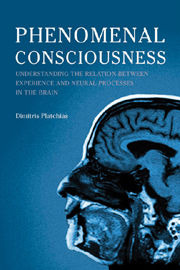Book contents
- Frontmatter
- Contents
- Acknowledgements
- Miscellaneous Frontmatter
- Introduction
- 1 The nature of the mind
- 2 Phenomenal consciousness: the hard problem
- 3 Phenomenal consciousness and the “sufficiency” claim
- 4 Experience and first-order representationalism
- 5 Experience and the explanatory gap
- 6 Experience and higher-order representationalism
- Notes
- Bibliography
- Index
Introduction
- Frontmatter
- Contents
- Acknowledgements
- Miscellaneous Frontmatter
- Introduction
- 1 The nature of the mind
- 2 Phenomenal consciousness: the hard problem
- 3 Phenomenal consciousness and the “sufficiency” claim
- 4 Experience and first-order representationalism
- 5 Experience and the explanatory gap
- 6 Experience and higher-order representationalism
- Notes
- Bibliography
- Index
Summary
Philosophers of mind are frequently faced with the following question: if you are interested in the mind, why not study brain science or psychology or artificial intelligence as opposed to philosophy? Another question often asked is: how can philosophy possibly contribute to our understanding of the workings of the brain and the nature of cognition and perception in general; or how can it possibly add anything to the ever-increasing wealth of empirical findings brought to light by cognitive scientists and neuroscientists in recent years? Philosophers generally respond that philosophy is (partly) concerned to find out which sciences are relevant and in what way they are relevant. However, this may not seem satisfying enough since what the above questions really amount to is: why should the study of the mind be a topic for philosophy at all as opposed to the sciences?
Well, in doing philosophy we can study the sort of answer that is required and then leave science to fill in the empirical details. And the truth is that the question of how we come to know about the nature of the mind is particularly difficult and vexing. Take, for instance, the common-sense view about people's mental states, such as beliefs, emotions and perceptual experiences. The general – intuitive – idea seems to be (even among scientists) that people's mental states are essentially private and inaccessible from a third-person perspective. There is some sort of access, a certain type of access we seem to have to our mental states, such that a mental state such as a toothache, or an emotional feeling such as being in love, is enjoyed by a single subject: the person who finds himself or herself in that mental state.
- Type
- Chapter
- Information
- Phenomenal ConsciousnessUnderstanding the Relation between Neural Processes and Experience, pp. 1 - 6Publisher: Acumen PublishingPrint publication year: 2010

